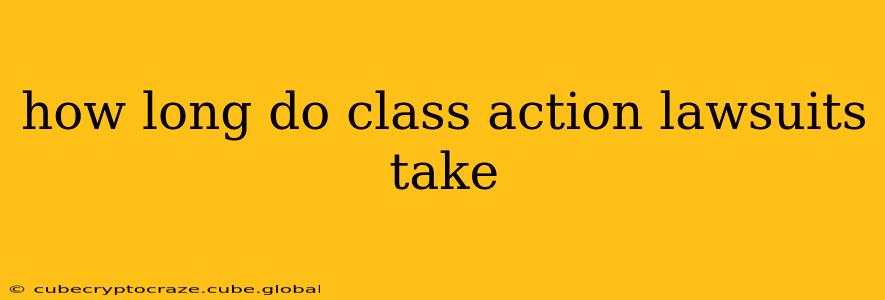Class action lawsuits, designed to resolve disputes involving numerous individuals harmed by the same wrongdoing, can take a surprisingly long time to reach a conclusion. The duration varies dramatically depending on numerous factors, making it impossible to provide a single definitive answer. However, understanding the key stages and influences allows for a better grasp of the potential timeframe.
What Factors Influence the Length of a Class Action Lawsuit?
Several critical elements significantly impact how long a class action lawsuit will take, sometimes spanning years, even decades in some complex cases.
-
Complexity of the Case: Simple cases with clear liability and readily quantifiable damages resolve faster than those with intricate legal arguments, multiple defendants, or extensive discovery processes. Cases involving complex financial instruments, technical products, or widespread geographical impact tend to take considerably longer.
-
Number of Plaintiffs: A larger class of plaintiffs naturally increases the time required for notification, participation management, and the eventual distribution of any settlement or judgment. Managing thousands or even millions of individuals adds significant administrative complexity.
-
Discovery Phase: This stage involves both sides exchanging evidence, including documents, emails, and witness testimony. The more extensive the discovery, the longer it takes. Complex cases often involve protracted legal battles over the scope and nature of discovery requests.
-
Negotiations and Settlements: Many class actions settle before reaching trial. However, even settlement negotiations can be lengthy and arduous, especially when dealing with multiple defendants or significant financial stakes. Reaching a consensus acceptable to all parties involved often requires extensive back-and-forth.
-
Legal Challenges and Appeals: Throughout the process, either party may challenge court decisions, leading to appeals that can significantly delay the final resolution. Appeals often involve multiple levels of the judicial system, adding months or years to the overall timeframe.
-
Trial (if it occurs): If a case proceeds to trial, the trial itself can be lengthy, particularly in cases involving numerous witnesses and complex evidence. Jury selection, presentation of evidence, closing arguments, and jury deliberations can all consume substantial time.
How Long Does Each Stage Typically Take?
While precise timelines are impossible, we can offer a general idea of the duration each stage might take:
-
Filing and Initial Stages: This can range from a few months to a year, depending on the court's docket and the complexity of the initial pleadings.
-
Discovery: This phase can take anywhere from six months to several years, depending on the complexity of the case and the cooperation of all parties. Complex cases with extensive document review and depositions can easily extend beyond two years.
-
Settlement Negotiations: Negotiations can range from several months to several years, particularly if there are numerous parties and significant disagreements.
-
Trial (if applicable): Trials can last anywhere from a few weeks to several months, depending on the complexity of the case and the amount of evidence presented.
-
Appeals (if applicable): Appeals can take anywhere from six months to several years.
What are the common types of class action lawsuits?
Many different types of situations can lead to class-action lawsuits. Some of the most common include:
-
Consumer fraud: This often involves deceptive marketing, defective products, or unfair business practices.
-
Antitrust violations: These cases allege anti-competitive practices by companies that harm consumers or competitors.
-
Employment discrimination: These lawsuits allege discrimination based on factors like race, gender, or age.
-
Securities fraud: This involves misrepresentations or omissions of material information by companies or their executives.
-
Data breaches: These cases arise when companies fail to adequately protect sensitive consumer information, resulting in identity theft or other harms.
How long does it take to get a settlement in a class action lawsuit?
The time it takes to receive a settlement in a class-action lawsuit is highly variable and depends on the factors discussed above. However, it's important to remember that even after a settlement is reached, it often takes additional time to distribute funds to class members. This distribution phase can take months or even years.
In conclusion, the length of a class action lawsuit is highly unpredictable. It's a complex legal process with numerous variables influencing its duration. While some cases resolve relatively quickly, many others require years, even decades, to reach a final resolution. Understanding the various stages and influential factors provides a clearer picture of what to expect.
